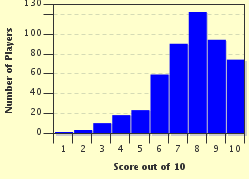Quiz Answer Key and Fun Facts
1. Paul Gallico wrote a novel, published in 1969, in which an ocean liner capsizes and survivors struggle to escape the overturned vessel. This was made into a movie in 1972. What is the name of both the novel and the movie, which name derives from the Greek god of earthquakes and the sea?
2. Ayn Rand's fourth, last and longest novel (1957) concerns a dystopic America in which the government controls industry. In it, the people who bring creative energy to the economy withdraw and disappear under the leadership of John Galt. The title refers to one of the Titans in Greek mythology. What is this title?
3. British Author Sarah Dunant (b. 1950) writes historical fiction revolving around strong female characters. Much of her work is set in Italy. In which novel, set in Renaissance Florence, does she introduce a young girl more interested in the painter hired to paint the family chapel than the husband who has been selected for her?
4. Australian science-fiction author Wynne Whiteford borrowed the title for his 1983 novel from a hammer possessed by one of the gods of Norse mythology. Which one was it?
5. Christopher Morley (1890-1957) was an Oxford-educated American novelist, poet and essayist who produced over a hundred books in his lifetime. His first novel, written in 1917, concerns a traveling bookstore. It is named after the home of the Muses in Greek mythology. What is its title?
6. Isabel Allende, a highly successful writer in both Spanish and English is well known for such novels as "The House of the Spirits" (La casa de los espíritus) and "City of the Beasts" (La ciudad de las bestias). Her memoir with recipes, a paean to the sensuality of food, was subtitled "A Memoir of the Senses." What was the title of this 1998 book?
7. Mary Shelley wrote "Frankenstein" when she was 19 years old. The subtitle of her novel, published in 1818, refers to a Titan, the brother of Atlas, who stole fire from the gods and shared it with humankind. Complete the title to Shelley's work -- "Frankenstein: The Modern _______."
8. In 1913, Irish playwright George Bernard Shaw wrote "A Romance in Five Acts" about a professor of phonetics who attempts to convert a Cockney girl into an apparent duchess by improving her speech. What was the name of this play?
9. Walker Percy's 1987 novel "The Thanatos Syndrome" was his last. Psychiatrist Tom More (from "Love in the Ruins") gets out of prison, returns to his Louisiana home town and discovers strange behavioural changes in everyone. In Greek mythology, who is Thanatos?
10. Which one of these book titles derives from the principal Norse god, after whom the English named the fourth day of the week?
Source: Author
FatherSteve
This quiz was reviewed by FunTrivia editor
Exit10 before going online.
Any errors found in FunTrivia content are routinely corrected through our feedback system.

